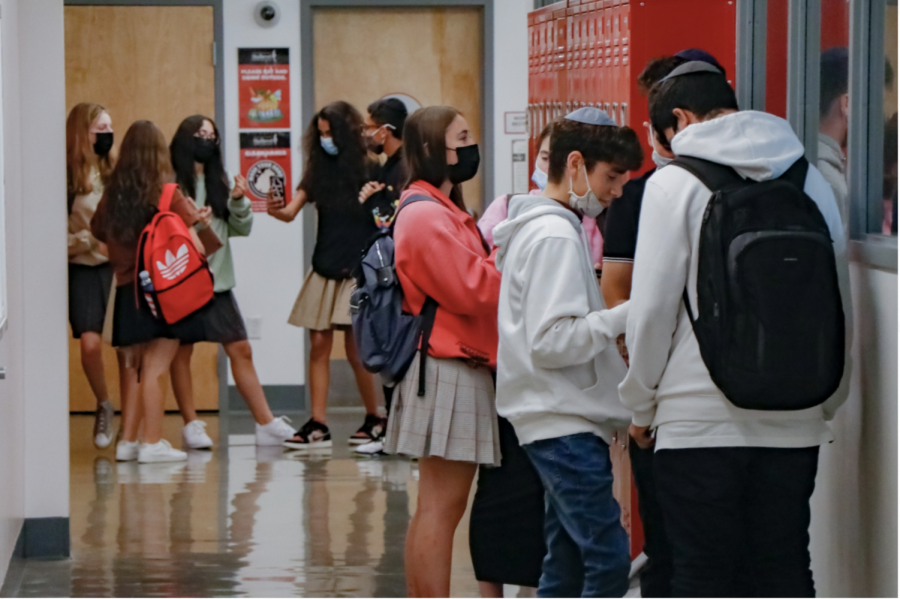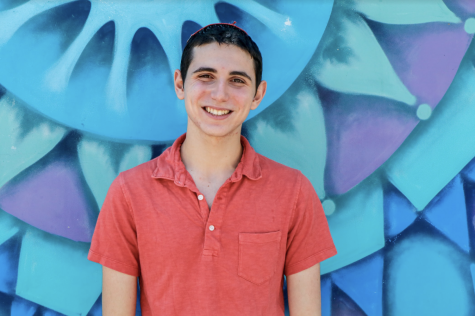Vaccines and distancing optional, masks required as school begins third Covid-affected year
BACK: Students filled the second-floor hallway above the gym last month, most wearing masks. “Like when someone reminds me, I immediately pull it up,” one student said.
October 11, 2021
Citing lack of full FDA approval for students ages 12 to 15, Shalhevet officials have for now decided not to require Covid vaccination this year as a condition of enrollment, though all students are now old enough to be eligible for a vaccine under the Pfizer shot’s Emergency Use Authorization.
School officials said that whether to mandate vaccines is a topic that is being revisited regularly, but for now it is not being
required.
“Originally, the vaccine was not FDA-approved at all,” said Head of School Rabbi David Block. “Since, the vaccine has been approved for those above 16, and while that’s a significant step forward, it does not apply to a significant portion of our students.
“Requiring something that doesn’t have that approval — especially for children and adolescents — is complex.”
On Sept. 9, the Los Angeles Unified School District voted to require vaccination for eligible students — anyone 12 and older — in order to attend in-person school. Culver City schools also require vaccination for in-person attendance.
On the East Coast, SAR Academy in New York and Charles E. Smith Jewish Day School in Maryland require vaccines, as does Milken Community High School in Los Angeles. YULA in Los Angeles does not.
On Oct. 1, Gov. Gavin Newsom announced that he was mandating vaccines for all public and private school students grades 7 to 12 after the FDA fully authorizes them.
According to Chief Operating Officer Ms. Sarah Emerson, as of Oct. 4, 72.5% of Shalhevet students and 97% of staff were fully vaccinated. She said that when “natural immunity” is factored in — that is, students who are not vaccinated but have recovered from the Covid infection — 82.5% of Shalhevet students have some protection against the disease.
She strongly encouraged vaccination and said unvaccinated students would “likely” be tested regularly beginning after Sukkot.
Ms. Emerson also said all Covid-related policies were under review at all times, and did not rule out requiring vaccines later.
“We are constantly monitoring developments in Covid,” Ms. Emerson said, “developments in the news, what other schools are doing, what the federal government is doing, what the state and county level are doing to help inform all of our decisions.”
In an email reply to Boiling Point questions, Rabbi Block said FDA approval is not the only consideration.
“Some additional factors that we considered include how best to be educators in this realm and move the needle on vaccines (without putting those hesitant on the defensive),” Rabbi Block wrote.
Meanwhile, Shalhevet required all students regardless of vaccination status to be tested for Covid in order to return to class after Sukkot break. The first day of post-break classes, set for Oct. 1, was cancelled and replaced with a mandatory Covid testing day.
Only students who have tested positive for Covid during the last 90 days — that is, who are known to have had the infection recently — are exempt from the testing.
While vaccines are not being required, Shalhevet is requiring all students and staff to wear masks indoors regardless of their vaccination status, in accordance with Los Angeles County Covid guidelines. Masking is not required while outside.
Since masks cannot be worn while eating, eating is not permitted in the cafeteria or anywhere else inside the building. Students are permitted to drink water indoors however.
“Being outdoors significantly mitigates the risk of transmission,” said Ms. Emerson in an interview with the Boiling Point.
It is not uncommon, however, to see some students, teachers and administrators not wearing masks indoors or wearing them improperly, such as below the nose.
One student who does not always wear masks indoors was willing to be interviewed if his name was not used. He said he is “not as diligent” as he should be.
“When someone reminds me, I immediately pull it up,” the student said. “Sometimes I either forget or if I’m reading something on my phone and I’m coming from the third floor where if I’m outside and I’m not wearing it, I’ll forget to pull it back on.”
“But if someone tells me to, I’ll definitely pull it back up.”
Junior Vivienne Schlussel said that maskless people indoors make her uncomfortable.
“It’s our job as people to respect other people and wear our masks for the better of the community,” said Vivienne. “So when people aren’t wearing masks indoors, it just shows a lack of respect and care for everyone else and it’s just not the safest thing to do.”
Ms. Emerson said mask-wearing would be enforced like any other rule at school.
“[It] is not just that it’s a mask mandate from the county, but it’s a Shalhevet rule,” said Ms. Emerson. “Is there some sort of detailed list of penalties — after this many violations this happens after that many violations that happens? No, that is not something that has been codified, so to speak.
“But definitely if there are repeated violation, after being asked or reminded or whatever, definitely there would be consequences.”
Unvaccinated students exposed to Covid and anyone who tests positive are being allowed to attend school via Zoom during their quarantine period.
“Any time someone is in quarantine and on Zoom, it is for a Covid-related reason,” Ms. Emerson said.
There have apparently been at least a handful of Covid-19 cases or exposures since the start of the school year, based on the number of students who can be seen attending via Zoom.
Ms. Emerson said Oct. 3 that nine students or staff had tested positive since the start of the school year on Aug. 26, along with Rabbi Block Block, who tested positive on Aug. 24.
‘That does not mean that nine have been on campus when contagious,” said Ms. Emerson. Rabbi Block became ill during orientation, which Ms. Emerson did not count as part of the school year.
Meanwhile, for the first time since March of 2020 all four grades are on campus together. Shalhevet began classes on Aug. 26.
The careful social distancing practices of last year and spring 2020 have become a thing of the past.
Over the summer, the school maintenance staff removed plexiglass dividers between desks, and the wall in between rooms 205 and 206, which they had removed last summer to create a larger, more distanced classroom last year, was put back up.
And Town Hall, davening and kumzitz events are all being held with students sitting next to one another as they were before the pandemic started.
Ms. Emerson said social distancing was recommended on campus when possible, but not required.
That was evident at a schoolwide Seudat Shlishit Aug. 28.
A video showing students and Judaic faculty dancing and singing maskless in Rabbi Stein’s backyard was posted on the school’s Instagram account.
But the event was outdoors, making it legal under county regulations.














